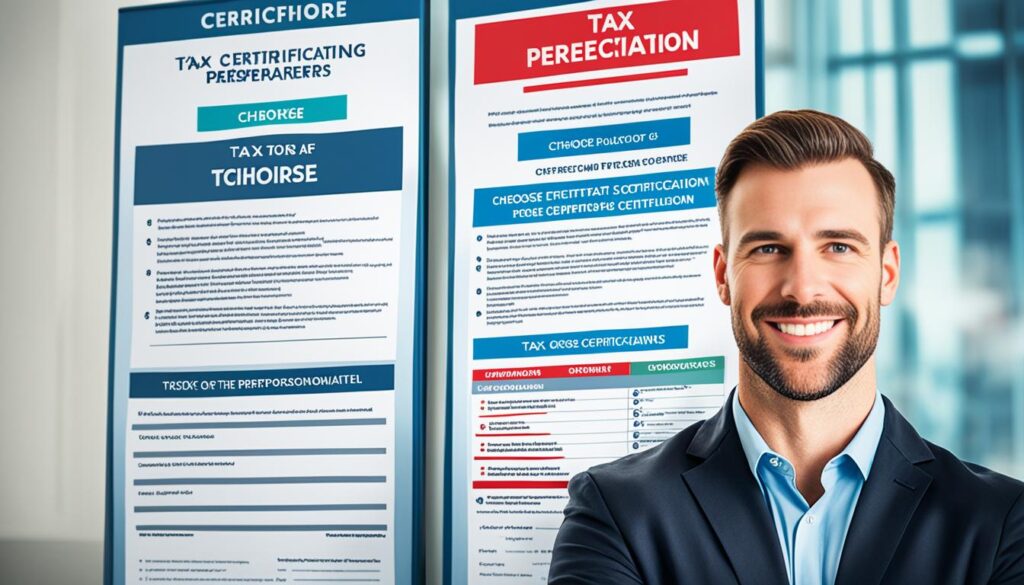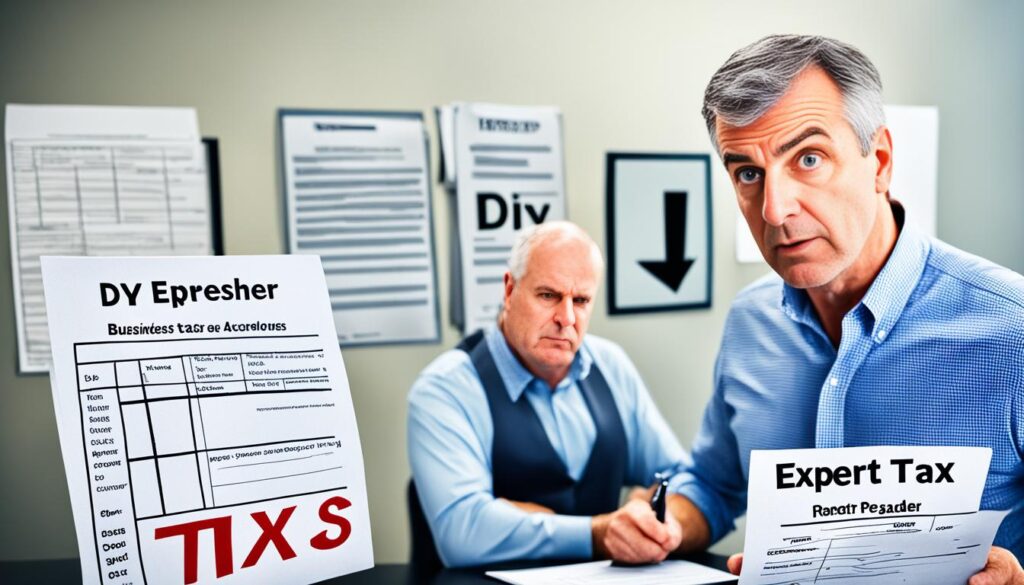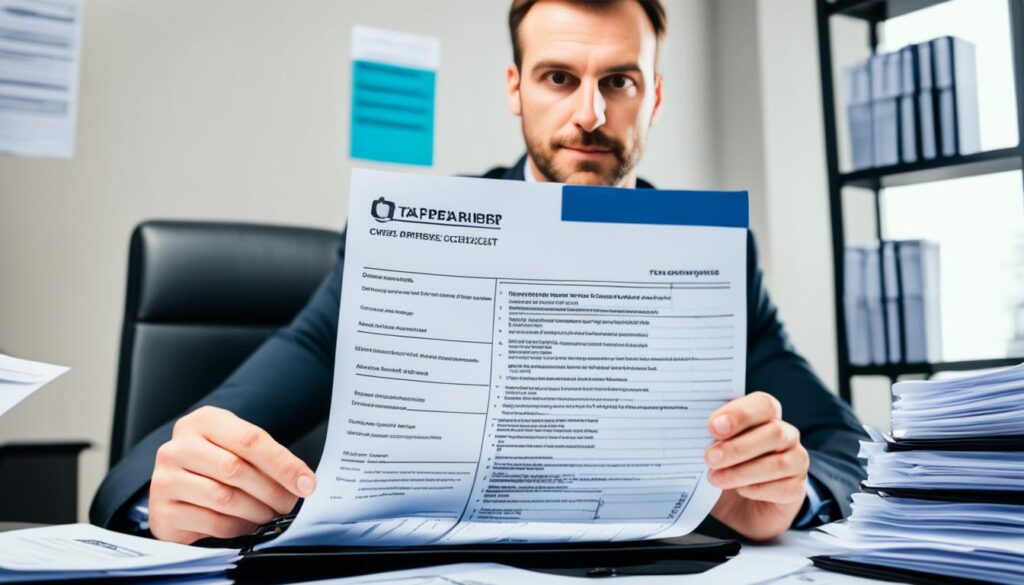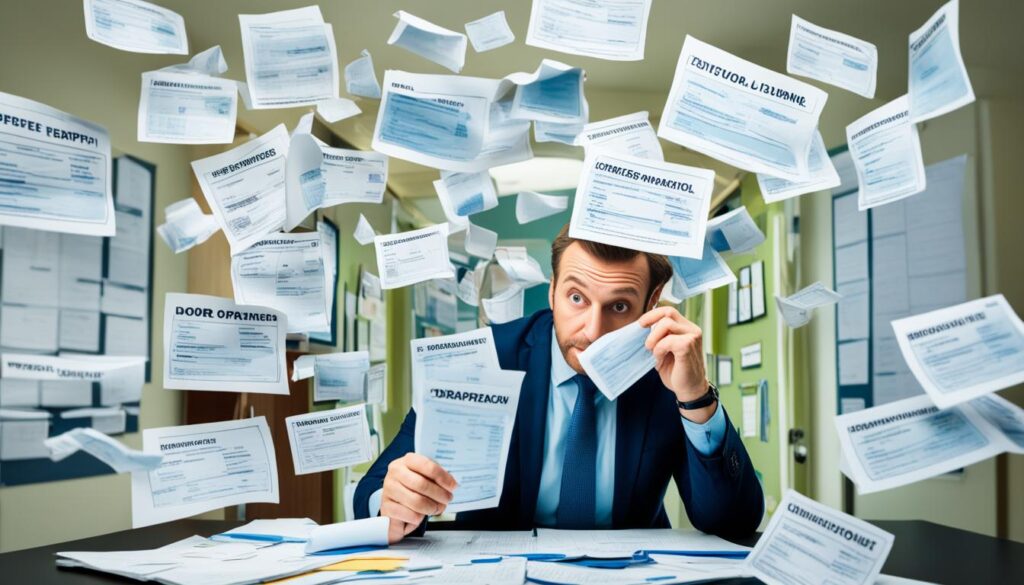Are you looking for the best tax preparer for your company? Do you want someone skilled to handle your financial matters? Finding the right tax professional might seem hard but we’ve got tips to help.
We will talk about what to look for in a tax preparer and what questions to ask. With this info, you’ll be ready to pick the perfect tax expert for your small business. This will help keep you on track and save you money.

Key Takeaways:
- Choosing a tax preparer for your business is crucial for compliance and maximizing your financial potential.
- Consider the qualifications of a tax preparer, such as specialization in corporate taxes and experience in preparing returns for businesses.
- Ask potential tax preparers about their tax background, specific experience with your type of tax return, and knowledge of state and local filing requirements.
- Understand the different types of tax preparers, including enrolled agents, certified public accountants (CPAs), and tax attorneys, to determine which one best suits your business.
- Take into account factors such as the preparer’s credentials, availability, fees, and ability to file electronically when making your final decision.
Qualifications to Look for in a Business Tax Preparer
When choosing a tax expert for your business, what they know is key. To pick the right tax preparer, think about these points:
1. Specialization in Corporate Taxes
Search for a preparer who knows corporate taxes well. They understand business tax return details. They know about the special deductions and rules for companies.
2. Experience in Business Tax Preparation
Choose someone experienced in business taxes. They should have a history of helping companies with their taxes. They know how to find savings and follow the rules.
“Choosing a tax preparer with expertise in corporate taxes can make a significant difference in the accuracy and optimization of your business tax returns.” – TaxExpert XYZ
3. Up-to-Date Knowledge
Tax rules change often. A good tax preparer keeps up with new laws and practices. They go to trainings, join groups, and research how changes affect your business.
4. Professional Certifications and Memberships
Look for a tax preparer with certifications like CPA or EA. These show they have passed tough tests on taxes. Being in groups like the NATP shows they care about staying current.
5. Client References and Reviews
Ask for references from other businesses. Happy clients show they do good work. Also, check their online reviews for more opinions on their work.
A qualified corporate tax consultant can help optimize your business tax returns.
6. Communication Skills
Good communication is important. Your tax preparer should make tax issues clear to you. They should answer your questions well and be easy to reach.
Thinking about these points will help you choose the right tax expert. They will guide you through tax complexities. This ensures you follow the rules and get the best out of your returns.
Questions to Ask a Potential Tax Preparer
When looking for the right tax preparer for your business, it’s key to ask the right questions. This helps you learn about their skills. And see if they’re a good match for your company’s tax needs. Here are some important questions to ask:
- What is your tax background?
- Do you have experience with the type of tax return I need?
- Are you knowledgeable about state and local filing requirements?
- Can you provide references from other business clients?
- How do you stay updated on tax law changes?
Knowing the preparer’s tax background is essential. Ask about their education, certifications, and any special training in business taxes.
Each business has unique tax needs. It’s important to find someone with experience in your specific area. Ask if they’re familiar with your industry and what types of businesses they’ve helped before.
Tax rules can differ by location. Make sure the preparer knows the requirements for where your business is based. This knowledge helps avoid any issues with the law that could lead to penalties or owed taxes.
Asking for references gives you insights into the preparer’s work. Contact these references to learn about their experiences and if they recommend the tax preparer.
Tax laws change often. A good tax preparer keeps up with these changes. Ask how they stay informed, like attending seminars or being part of professional groups.
Choosing the right tax preparer takes careful thought and questions. By asking these key questions, you can pick a tax preparer who will meet your company’s tax duties well.

Understanding the Different Types of Tax Preparers
When you’re looking for someone to take care of your corporate taxes, knowing the types of tax preparers is key. Each has different qualifications and skills. It’s vital to learn about them to pick the best one for your business.
Enrolled Agents (EAs): Enrolled agents are certified by the IRS. They excel in tax matters thanks to intense tests and ongoing education. They represent taxpayers before the IRS too.
Certified Public Accountants (CPAs): CPAs are professionals who’ve passed the CPA Exam. They also meet state licensing rules. CPAs know a lot about accounting and offer services like tax planning.
Tax Attorneys: Tax attorneys are legal experts in taxes. They know the tax laws well and offer help with complex tax problems. This includes audits, disputes, and legal issues.
Each tax preparer offers unique benefits. Enrolled agents are tax experts who can stand for taxpayers at the IRS. CPAs bring accounting knowledge and a range of financial services. Tax attorneys give detailed legal advice on complex tax issues. Keep your business needs in mind to choose the right tax pro.
Comparing the Different Types of Tax Preparers
| Tax Preparer | Qualifications | Expertise |
|---|---|---|
| Enrolled Agents (EAs) | Licensed by the IRS, extensive tax knowledge | Tax preparation, planning, and representation |
| Certified Public Accountants (CPAs) | Passed the Uniform CPA Examination, state-licensed | Tax preparation, accounting, financial services |
| Tax Attorneys | Lawyers specialized in tax law | Legal representation, tax disputes, litigation |
Choosing a tax preparer is crucial for your company. Consider their skills, knowledge, and how they can meet your tax needs. Take time to research and choose the best professional to manage your business taxes effectively.

Tips for Choosing the Right Tax Preparer
Choosing the best tax preparer for your business is key. Look at their credentials, availability, fees, and if they file electronically. Also, getting referrals and checking their history with the Better Business Bureau is wise. It’s important to trust in their expertise for a good partnership.
Factors to Consider for Choosing a Tax Preparer:
- Credentials: Find a tax preparer with the right certifications. They should know tax laws well. Look for a Certified Public Accountant (CPA), Enrolled Agent (EA), or Tax Attorney.
- Availability: Make sure the tax preparer is there when you need them, during tax season and after. They should quickly answer your questions and support you always.
- Fees: Talk about their fees before you start. You should feel okay with what they charge. Remember, good advice usually comes at a fair price.
- Electronic Filing: Ensure they can file returns electronically. It’s easier, faster, and cuts down on mistakes.
“Choosing the right tax preparer can have a significant impact on your business’s financial health. Take the time to research and evaluate different options to find the best fit for your specific needs.” – [Expert Name]
Also, ask other business owners for referrals. These can lead you to a trusted and reliable tax preparer. Lastly, check the preparer’s background for any issues. The Better Business Bureau can offer insights into their reputation, helping you choose wisely.

| Factors to Consider | Description |
|---|---|
| Credentials | Look for professionals with credentials such as CPA, EA, or Tax Attorney. |
| Availability | Ensure the tax preparer is accessible during tax season and available to provide ongoing support. |
| Fees | Discuss the cost of their services upfront and ensure you are comfortable with their fee structure. |
| Electronic Filing | Confirm that the tax preparer is equipped to file tax returns electronically for faster processing. |
Importance of Reviewing and Signing the Tax Return
Before you sign your tax return, make sure to review it well. This helps catch errors and make sure everything is right. By checking your return, you can avoid mistakes that might cost you money.
1. Double-Check for Accuracy
Look over every item on your tax return for accuracy. Make sure there are no wrong social security numbers or income amounts. Also check for any missing deductions or credits. Paying attention to these details helps ensure your return is correct.
2. Seek Clarification and Ask Questions
If there’s something on your tax return you don’t understand, ask questions. Talk to the person who prepared your taxes to get answers. This will help you understand your return better and ensure it’s accurate.
3. Protect Your Privacy
Make sure you know how your tax preparer keeps your information safe. Privacy is key, so check they use encryption and handle documents securely. They should have strong policies to keep your data confidential.
4. Ensure Direct Refund Deposit
If you’re getting a refund, give the correct bank details for direct deposit. This makes sure you get your refund without delays or problems.

5. Carefully Review Supporting Documents
Before signing, check all your supporting documents, like W-2 forms and receipts. Compare them with what’s on your tax return for consistency. This ensures everything matches up.
6. Retain a Copy for Your Records
After reviewing and signing your tax return, keep a copy. This can help if any issues come up later on. It’s good to have your own records.
Reviewing your tax return carefully helps ensure everything is in order. For extra security, consider talking to a tax professional. They can help make sure you follow the rules and get all possible benefits.
Reporting Abusive Tax Preparers and Fraud
While most tax preparers are honest, it’s important to be aware of potential fraud. Know how to report abusive preparers to the IRS. Being cautious of fraudulent practices can protect your business and finances. Here are some steps to follow:
Identifying Abusive Tax Preparers
Abusive tax preparers can engage in deceitful practices. Some include:
- Promising unrealistically high refunds
- Encouraging illegal deductions or credits
- Asking you to sign a blank or incomplete tax return
- Refusing to sign the return themselves
If you see these warning signs, be careful. Consider reporting the preparer.
Reporting to the IRS
If you think you’ve been a victim of an abusive tax preparer, you can report them to the IRS. Use the following methods:
- Form 14157: Fill out and send Form 14157, Complaint: Tax Return Preparer. Include any supporting evidence, like copies of communications or suspicious tax returns.
- Form 14157-A: If the preparer used your info without permission, fill out and send Form 14157-A, Tax Return Preparer Fraud or Misconduct Affidavit.
- Email: Email reportpreparerfraud@irs.gov with details and documents.
- Phone: Call the IRS fraud hotline at 1-800-366-4484. Report the preparer and give them the needed info.
“It’s crucial to be proactive in reporting abusive tax preparers to protect yourself and other businesses. By reporting fraudulent activities, you can help maintain the integrity of the tax system and prevent further harm.”
It’s always smart to seek help from a reputable tax specialist or accountant. They ensure compliance and accurate tax return preparation for your business. Hiring a trusted professional greatly reduces the risk of fraud.
| Resources | Contact Information |
|---|---|
| IRS Office of Professional Responsibility | Contact Information for Enrolled Agent Program |
| IRS Office of the Inspector General | Report Fraud, Waste, or Abuse |
| Better Business Bureau | Check BBB Rating Changes |
In the next piece, we’ll offer more tips on choosing a business tax preparer. We’ll include how to use IRS resources to find qualified experts.

Additional Tips for Choosing a Business Tax Preparer
When picking a tax preparer for your business, think about more than just their skills and past work. The following advice will guide you to the right person for your firm:
- Availability for Post-Filing Assistance: Make sure the tax preparer can help you after filing. They need to be ready to answer any questions during tax time.
- Providing Records and Receipts: A good tax preparer will ask for your business documents. Have your records and receipts ready. They are key for correct filing.
- Filing Electronically: Choose someone who files returns online. It’s faster and has less errors. E-filing is safe and makes refunds come quicker.
Check the credentials of the tax preparer you’re considering. Their knowledge is vital for correct tax work. Also, they must put their Preparer Tax Identification Number (PTIN) on your return. This shows they follow IRS rules.

Keep these tips in mind to find a tax preparer that fits your business needs. They will help your company succeed financially.
Using IRS Resources to Find a Qualified Preparer
The IRS offers helpful resources to find a good tax preparer for your business. They have a directory of federal tax preparers with the right credentials. This makes it easy to find someone who meets your needs.
Choosing a preparer from the IRS directory means they meet important criteria. They are qualified to manage your business taxes efficiently and correctly. This gives you confidence that your taxes are in good hands.
Take the time to check the credentials of potential tax preparers in the IRS directory. Look for those with business tax preparation experience and knowledge of your industry. It’s crucial to find someone who can maximize your deductions and credits.
It’s vital to pick the right tax specialist for your business’s financial health. Use the IRS resources to find a qualified preparer. They will help you handle the complexities of business taxes.

Benefits of Using IRS Resources:
- Easy access to a directory of federal tax preparers
- Ability to filter and search for professionals based on credentials and qualifications
- Peace of mind knowing that the preparers listed have met certain criteria
- Specialized knowledge of business tax requirements
- Assistance in maximizing deductions and credits specific to your industry
Conclusion
Choosing the right business tax preparer needs careful research and thought. Ask the right questions and check their qualifications well. This way, you can pick the best tax expert for your small business. A skilled tax advisor will help you understand tax laws and get more deductions.
By selecting wisely, you can trust an experienced tax preparer with your finances. They know small business taxes well. This peace of mind lets you concentrate on growing your business.
Look into their credentials, experience, and how often they’re available. Feel free to ask for recommendations or check their history with professional groups. Spending time to find a great tax preparer means your small business gets good tax advice and services.